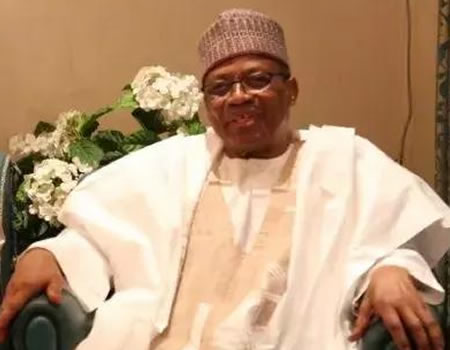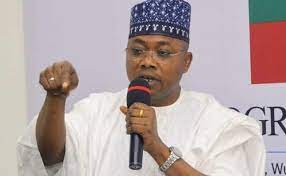Guest Columnist
The nomenclature error of Babangida’s administration in Kogi State naming

Guest Columnist By Alexius A. Maiyanga
One of the enduring legacies of the military juntas in Nigeria is the creation of States. First, the regions were replaced with 12 States in 1967 by General Yakubu Gowon and this was followed by another 12 States in 1976 by General Muritala Mohammed. Two States were created by General Ibrahim Babaginda in 1987 and nine more in 1991 and General Sani Abacha completed the exercise in 1996 with 6 States making the 36 States in the Federal Republic of Nigeria.

In the 1999 constitution and under the General Provisions Part 1(3) (1), all the names of States are therein stated, which means nothing can be done except through legislative re-engineering. That is why this writer submitted all pertinent papers concerning this discriminating decision of Babangida’s government on 8th March, 2024 to the National Assembly for the amendment of the constitution regarding Kogi state’s name.
Notwithstanding, it is imperative to inform the wider audience of the entire Nigerians of the sins former President Ibrahim Babangida committed against the so-insulted peoples around the confluence of the Niger and Benue rivers hence, this short write-up.
When William Shakespeare asked the question, ‘what is in a name? in Romeo and Juliet, he referred to the idea that names themselves are a convention to distinguish things or people, although names themselves do not have any worth or meaning. Contrary to Shakespeare’s thinking, Africans attribute great value to names. That is why we have naming ceremonies because of the denotative and connotative weight it carries.
Additionally, African names are meaningful which means they are pathologically attached to our psyche and sensibilities. Thus, our names are an incredibly important part of our identity. They carry very deep personal, cultural, emotional and historical connections. Names also give us a sense of who we are, the communities in which we belong and our place in the world.
With studied realization and confirmed by Hausa Dictionary, the word ‘Kogi’ means RIVER. The word Kogi is also Chibchan Language of the Colombians. The kogi people of Colombia are almost entirely monolingual and maintain the only unconquered Andean colonization.
The pertinent question that has arisen is: which of the Kogis was the State named after by President Ibrahim Babaginda’s administration? People of the present area called Kogi are not Hausa-speaking people, consequently, the word Kogi has no cultural, social linguistic, economic, geographical, political, demographic attributes to the people and the area and therefore not consistent with the prospective/new nomenclature rightly being suggested.
This is tasteful in flavour with what President Tinubu was quoted to have said in Thisday newspaper of 25th June, 2024 and I quote: “We can’t achieve security, peace without dealing with historical injustices.” Calling us Kogites is an insult to the collective sensibilities of an informed Ebiras, Igalas, Okuns, Oworos, etc.
From my studies, the names of the 36 states in Nigeria, and just the names of the 50 States of the United States of America, stem from historical, geographical, and cultural influences. Some States are however named after a town in those states.
For instance, Abia State is said to be an acronym from the four groups of people in the State as at the time of creation in 1991 i.e. Aba, Bende, Isuikwuato, and Afipko. Taraba State is derived from Taraba River which traverses the southern part of Taraba. Adamawa State is named after Modibo Adama, a Fulani warrior who founded the Adamawa Emirate. Sokoto is a town, and it is the name of a Sokoto State. Same is Bauchi, Gombe, Lagos, Enugu, Kano, Katsina.
One of the prominent geographical features of the present area wrongly called Kogi State is where two great rivers Niger and Benue meet. The convergence of these rivers has produced one of greatest confluences in the world and the hugest in Africa. This amazing, breath-taking confluence is a prodigious economic potential that should not be hidden under any guise of naming a State.
Globally, tourism has become a sustainable revenue spinner competing favorably with the manufacturing sector. In 2018, Meseka et al in their profound research paper on Tourism Potentials of Lokoja, tried to situate the fact that tourism development is predicated on the availability of natural setting that can be explored and developed to ensure patronage of people for economic viability.
Lokoja is historical town in Nigeria of national significance. The first Governor General of Nigeria, Lord Fredrick Lugard during the colonial period ruled Nigeria from Lokoja. The old residence of this first ruler which today is a tourist relic could as well be referred to as the Nigeria’s first State House.
When Gombe, Kaduna, Kano, Kastina, Lagos, Sokoto, Bauchi, Kebbi towns were being named as States names, Lokoja town also existed with the following historical significances. Lokoja, to say the least, is the host of the great confluence of Rivers Niger and Benue, Mount Patti, Lord Lugard’s Quarters, Club 1901, the spot where the flag of the Royal Niger Company was lowered in1890, the Trinity School as the 1st School in Northern Nigeria, Iron of Liberty (the spot where slaves were freed, the cenotaph, the first prison yard in Nigeria.
Is it not baffling to an un-mischievous mind that Kogi state was rather given an un-inspiring name as Kogi which does not portray the huge economic potentials of the city of Lokoja? What on earth informed the hiding this behemoth economic wealth for the confluence of rivers Niger and Benue in the promotion of tourism, agriculture even during the dry season?
Nigeria is not the only country where States are created named even further renamed. Even countries have had names changed. Burkina Faso used to be called Upper Volta; Ghana used to be called Gold Coast and not too long ago, the spelling of Turkey has been changed to Turkiye; Nigeria has just reverted to the old National Anthem. Nothing therefore is cast in granite.
America has about 50 states and virtually all of them were created along with natural phenomena within that geo-political area. A few examples need to be cited here to justify our assertion and the unassailable reason why the State Kogi should be renamed CONFLUENCE STATE or LOKOJA STATE.
The State of Alabama is a name from an Indian tribe of the creek confederacy originally called the Alabamas or Alibamons, who in turn gave the name to a river from which the State’s name was derived. Alaska (Alakshak) is an Eskimo word, meaning peninsula or great lands. Arizona means arid zone or desert. Massachusetts is the first State to have an Indian name. From the Algonquin word, Massadchu-es-et meaning great – hill-small-place was derived the name of the state of Massachusetts. This is possibly because of the hills around Boston as seen from the bay.
The Nigerian constitution in Chapter 5. Part 1. Section 55 says the business of the National Assembly shall be conducted in English and in Hausa, Ibo, and Yoruba when adequate arrangements are made. If Kogi’s name is done by military fiat, the National Assembly should not continue that aberrational trajectory.
Thus, the nomenclature of Kogi was and remains a linguistic and constitutional mistake which should urgently be redressed because at the dawn of constitutional democracy, all decrees were automatically recalibrated into Acts of Parliament.
Through this piece, we call on the National Assembly to undo the injustice of President Babangida’s administration. Our consolation is that in a democracy, critical thinking, robust analysis, and informed debates are deployed by a National Assembly before durable decisions are reached, and we are deeply in that era.






![CDS mourns late Ogohi, says he was patriotic throughout his lifetime [Pictorials] Ibrahim Ogohi](https://www.capitalpost.ng/wp-content/uploads/2024/06/Ibrahim-Ogohi.jpeg)


















